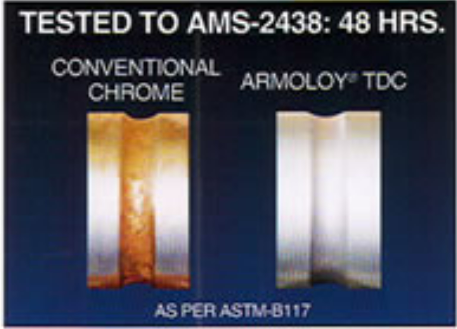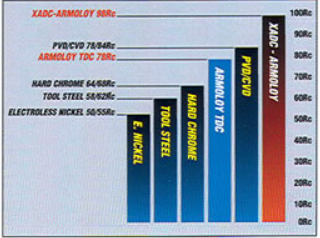Knowde Enhanced TDS
Identification & Functionality
- Chemical Family
- Product Type
- Technologies
- Product Families
Features & Benefits
- Ready-to-Use Product Features
- Value-Added Benefits of Armoloy® TDC Coating
- 78Rc Surface Hardness
- Reduced wear and corrosion resistance
- Absolute adhesion to basis metal- no chipping, cracking, flaking or peeling
- Improved release characteristics in plastics forming tools-cores, cavities, lifters, pins, screws, plates
- Reduced maintenance and part replacement costs
- Extraordinary Properties
Armoloy® TDC is unlike all other conventional hard chrome plating operations. Our proprietary TDC coating conforms precisely to details in metal tools, resulting in a hard (78Rc), slippery, and corrosion-resistant tool surface. RMS finishes will improve slightly to 8 (Below 8 the process may deter slightly.) Surfaces greater than will reflect greatly improved finishes. Both internal and external surfaces on all part configurations can be uniformly processed. Employed as the finishing step for machine parts and manufacturing components, Armoloy® imparts a satiny, silver matte, micro-nodular finish.
- Product Highlights
- A Guideline for Armoloy® TDC Success - As the surface hardness and surface finish of your basis metals improve, the performance of the Armoloy® TDC coating also improves. To maximize Armoloy® TDC performance, components should be engineered to a minimum of 50Rc, 40 pt. carbon steel with a minimum surface finish of 32.
- Prevention of Hydrogen Embrittlement - Armoloy® TDC process control prevents the embrittlement phenomenon from occurring,though original manufacturing conditions may not, necessarily, be removable. The Armoloy® TDC process will not affect the tensile, yield or fatigue properties of the basis metal. Pre- and post-baking are available upon request or specification. Armoloy® TDC certifies to AMS QQ-C-320, AMS-2406, and most other military/industrial specifications.
- Corrosion Resistance - Armoloy® TDC resists attack by most organic and inorganic compounds, except sulfuric acid and hydrochloric acid. Inferior metal surface finish and low part hardness may inhibit Armoloy® TDC's corrosion-resistant properties.
Applications & Uses
- Markets
- Applications
- Compatible Substrates & Surfaces
Properties
- Typical Properties
| Value | Units | Test Method / Conditions | |
| Temperature | -400 to 1600 | °F | - |
Regulatory & Compliance
- Certifications & Compliance
- Safety and Cleanliness
FDA/USDA approved for use, without concern on food processing equipment, in clean room environments and in Medical/pharmaceutical applications. Independent testing has proven no issue of toxicity or skin irritation in Armoloy® TDC coated parts.
Technical Details & Test Data
- Product Efficiency Comparison

- 78Rc Wear-Resistant Hardness
- 78Rc Surface Hardness
- Vickers Diamond: 1360/1400

Comparative Hardness
Uniform Deposits With Armoloy® TDC
- Deposit Range
- .000040/.0001” (1.0 - 2.5 microns)
- .0001/.0003” (2.5 - 7.5 microns)
- .0002/.0004” (5 - 10 microns)
- .0004/.0007” (10 - 17.5 microns)
- Tolerance Range
- ±.000025” (±0.625 microns)
- ±.000050” (±1.25 microns)
- ±.0001” (±2.5 microns)
- ±.00012” (±3.0 microns)

